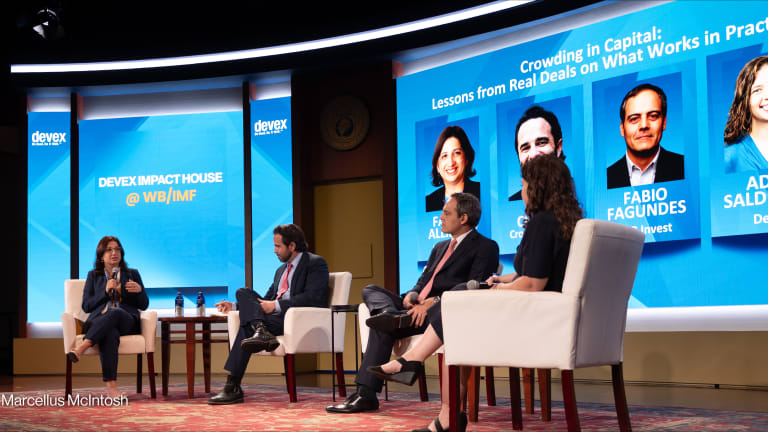Why more NGOs are choosing co-leadership — and how to make it work
More NGOs are adopting co-leadership in a move to share power. Devex spoke to co-leaders about what it takes to make it work and the positive impact it can have on everything from decision making to leadership transitions.
Over the past few years, more NGOs have adopted co-leadership models — appointing co-CEOs or co-executive directors — in a drive to share power and bring in leaders with different experiences and skillsets. Mama Cash, Greenpeace UK, Open Philanthropy, and the African Visionary Fund are among the organizations in the global development space that now have co-leaders. There are various driving forces behind this trend. The COVID-19 pandemic pushed many organizations to adopt more flexible ways of working, and co-leadership can help to enable this in the C-suite too. Calls to decolonize the development sector and to improve diversity, equity, and inclusion — especially at the top — have also been important. “All of the models I've ever seen of leadership is really the single leader, the superhero character — and those are the dominant models in the world. … We have to do a lot of unlearning of how power operates and how decisions get to be made,” said Happy Mwende Kinyili, co-executive director of the feminist fund Mama Cash, which now has one leader in the Netherlands, where the organization was founded, and another in Kenya. Co-leadership, if done right, can increase the quality of decision making, improve accountability, and allow for smoother leadership transitions, advocates say. It can also have a positive impact on the mental health of leaders by making it less “lonely at the top,” according to NGOs who spoke to Devex. “This cannot be a top-down decision. Because the whole organization needs to be supportive of it for it to be successful.” --— Happy Mwende Kinyili, co-executive director, Mama Cash But while smaller and more progressive organizations — especially in the environmental sector — are thinking seriously about co-leadership, more traditional organizations might struggle with the concept, explained Suzie Mills, the global communications director at Oxford HR. The consultancy, which supports social and environmental impact organizations, has been seeing more interest in recruitment services to help hire co-leaders. “No matter the size of the organization, you've got to be super clearly defined in the roles and how you're doing it,” she said. The case for co-leadership African Visionary Fund was founded in 2020 as a grant-making mechanism supporting African social entrepreneurs. Because of its mission to address racial inequality in funding, it had envisioned a co-leadership model from the start. “The fund itself had to reflect the work it's doing,” said Atti Worku, who was brought on as a co-CEO alongside founder Katie Bunten-Wamaru in 2021. The organization also didn’t want to make the United States the headquarters or the center of their work, according to Worku, who is based in Ethiopia, while her co-leader is in the U.S. While many simply opt for hiring country directors, “they really wanted this to reflect the equitable nature of the mission, and how they were putting the people proximate to the issues in the position to make decisions,” she said. While some of their work overlaps — both co-CEOs are responsible for finance, strategy, and board management — Worku focuses on grantmaking and Bunten-Wamaru on fundraising. Worku also thinks co-leadership creates a more supportive environment for leaders. As a former CEO, “the idea of not having to make all the decisions on my own was actually preferable, to have a partner to think through challenging things together,” she said. Smoother leadership transitions are another benefit of the model. Before Mama Cash’s former executive director left, Mwende was able to share the leadership role with her for six months and help bridge that gap. Better decisions and accountability One of the biggest benefits of co-leadership that organizations cited is how it improves decision making. “There's a greater degree of strength in the decisions that we make. There's also greater degrees of accountability between Happy and myself,” said Saranel Benjamin, co-executive director at Mama Cash. It also creates a space for collaboration and brings in different perspectives that can generate better and more creative ideas, she explained. When adopting co-leadership, Mama Cash wanted to make sure there weren’t any bottlenecks around decision making, so the two co-leaders sat down and split some of the work and responsibilities down the middle, explained Benjamin, who manages two of the organization’s teams, while Mwende manages the other two. Several organizations Devex spoke to stressed the importance of being clear about who reports to whom and which decisions need input from all co-leaders. For decisions that do need both leaders’ input, it can sometimes affect the pace of the organization, explained Mwende. But ultimately, “the quality of decision making is better.” While some organizations have different job descriptions for each co-leader, Mama Cash deliberately created one job description for their two leaders, who each work full time. The focus of this “fluid” model is on sharing tasks and responsibilities as they come up, although there are still clear line-reporting structures. By contrast, in a “fixed” model, co-leaders have different job descriptions. For example, one might be focused on fundraising and external relations, while the other is more focused on operations. Both models have their pros and cons, and the choice will sometimes depend on an organization’s finances, according to Mills. Organizations such as UK Youth for Nature have opted for two co-directors who work three days a week each, including one day of overlap, instead of having two full-time leaders, she said. Communication and shared values For both Mama Cash and African Visionary Fund, ensuring the co-leaders have a set of shared values was a key part of the recruitment process. “These two people have to work very closely together, and the less discomfort they have working together, the better things will go,” said Worku. During her recruitment process, there were a lot of conversations and processes to help understand personality, including personality tests that both co-leaders had to take. They also had leadership coaches come in to help them figure out how to work best together, she explained. Oxford HR’s Mills believes psychometric assessments are important for understanding things that might not come up in an interview but are key to how the partnership would or wouldn’t work, she explained. Ensuring good communication and making space to meet regularly is also key. “The most important thing for us is that we have an open line of communication. … And also constantly being available, honest with each other, and supportive,” Worku said. Some of the biggest challenges with co-leadership don’t come from within the organization but come from external pressure or questioning, explained Worku. “People don't really believe we're co-leaders. They'll be like, but who's the real CEO? Who makes the real decisions? Because that's how people are conditioned,” she said. Since Worku’s co-CEO is white, there’s often a racial dynamic where people think she’s the “real” boss and that Worku is just the co-CEO on paper, she explained. Making co-leadership work also requires support from the entire organization — and that might sometimes mean a shift in mindset. “It takes time to get the organization to support it, this cannot be a top-down decision. Because the whole organization needs to be supportive of it for it to be successful,” said Mwende.
Over the past few years, more NGOs have adopted co-leadership models — appointing co-CEOs or co-executive directors — in a drive to share power and bring in leaders with different experiences and skillsets.
Mama Cash, Greenpeace UK, Open Philanthropy, and the African Visionary Fund are among the organizations in the global development space that now have co-leaders.
There are various driving forces behind this trend. The COVID-19 pandemic pushed many organizations to adopt more flexible ways of working, and co-leadership can help to enable this in the C-suite too. Calls to decolonize the development sector and to improve diversity, equity, and inclusion — especially at the top — have also been important.
This story is forDevex Promembers
Unlock this story now with a 15-day free trial of Devex Pro.
With a Devex Pro subscription you'll get access to deeper analysis and exclusive insights from our reporters and analysts.
Start my free trialRequest a group subscription Printing articles to share with others is a breach of our terms and conditions and copyright policy. Please use the sharing options on the left side of the article. Devex Pro members may share up to 10 articles per month using the Pro share tool ( ).
Natalie Donback is a freelance journalist and editor based in Barcelona, where she covers climate change, global health, and the impact of technology on communities. Previously, she was an editor and reporter at Devex, covering aid and the humanitarian sector. She holds a bachelor’s degree in development studies from Lund University and a master’s in journalism from the University of Barcelona and Columbia Journalism School.








